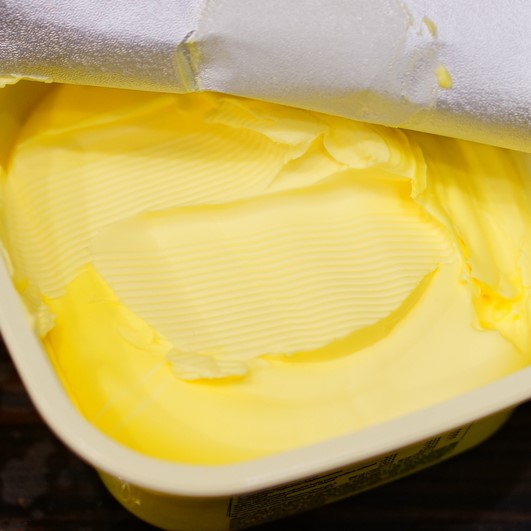For years, margarine has been touted as a healthier alternative to butter. Many of us grew up hearing that margarine was the smarter choice for our hearts and waistlines. But what if we told you that everything you thought you knew about margarine might be wrong? Brace yourself for some eye-opening revelations that may have you second-guessing your spread selection.
1. Margarine is Highly Processed
Unlike butter, which is made from cream or milk, margarine is a product of complex industrial processing. It’s created by blending vegetable oils with water, salt, and emulsifiers to create a butter-like consistency. This process, called hydrogenation, can result in the formation of unhealthy trans fats.
Hydrogenation involves adding hydrogen to vegetable oil to make it solid at room temperature. While this process extends the shelf life of margarine, it also creates artificial trans fats, which have been linked to numerous health issues. Many manufacturers have moved away from using hydrogenated oils, but some margarines may still contain these harmful fats.
In contrast, butter is a minimally processed food made by churning cream or milk. It contains just one ingredient: dairy. While butter does have its own health concerns due to its high saturated fat content, it’s still a more natural choice compared to the heavily processed nature of margarine.
2. Some Margarines Contain Trans Fats
Trans fats are created during the hydrogenation process used to make margarine. These artificial fats have been shown to increase the risk of heart disease by raising levels of LDL (bad) cholesterol while lowering levels of HDL (good) cholesterol. Trans fats have also been linked to inflammation, diabetes, and other health problems.
While the FDA has banned the addition of artificial trans fats to foods, some margarines may still contain naturally occurring trans fats. These natural trans fats, found in small amounts in meat and dairy products, are not considered as harmful as artificial trans fats. However, it’s still important to check the nutrition label and ingredient list to ensure your margarine is trans-fat-free.
Stick margarines tend to have higher levels of trans fats compared to tub or liquid margarines. So, if you do choose to use margarine, opt for softer varieties and always read the label to avoid any hidden trans fats.
3. Margarine May Lack Beneficial Nutrients
While butter is often demonized for its high saturated fat content, it actually contains several beneficial nutrients. Butter is a natural source of vitamins A, D, and E, as well as lauric acid, which has antimicrobial properties. Some studies have even suggested that the saturated fats in butter may not be as harmful as previously thought.
Margarine, on the other hand, is often lacking in these natural nutrients. While some margarines are fortified with vitamins, these synthetic versions may not be as easily absorbed by the body compared to their naturally occurring counterparts. Plus, the processing involved in making margarine can strip away any inherent nutritional value from the vegetable oils used.
If you’re looking for a spread that offers some nutritional benefits, you may be better off choosing a nut butter or mashing avocado on your toast instead. These options provide healthy fats, fiber, and various vitamins and minerals that can support overall health.
4. Margarine Often Contains Additives
To achieve the desired texture, flavor, and shelf life, manufacturers often add various ingredients to margarine. These additives can include emulsifiers, preservatives, colors, and flavors. Some of these additives have been linked to health concerns, such as increased inflammation and digestive issues.
Emulsifiers, like mono and diglycerides, are often added to margarine to help blend the water and oil components. While these additives are generally considered safe, some studies suggest they may have a negative impact on gut health. Preservatives, such as potassium sorbate and calcium disodium EDTA, are used to extend the shelf life of margarine but may also have adverse effects on health.
If you’re aiming to minimize your intake of artificial additives, margarine may not be the best choice. Opting for a simple, minimally processed spread like butter or a pure nut butter can help you avoid unnecessary ingredients.
5. Margarine May Contribute to Inflammation
Some studies have suggested that consuming margarine may contribute to inflammation in the body. Inflammation is a natural response to injury or infection, but chronic low-grade inflammation has been linked to various health problems, including heart disease, diabetes, and certain cancers.
The high levels of omega-6 fatty acids found in some vegetable oils used to make margarine may promote inflammation when consumed in excess. While omega-6 fats are essential for health, the modern Western diet often includes too many of these fats in relation to anti-inflammatory omega-3 fats.
To help reduce inflammation, it may be beneficial to choose spreads that contain a more balanced ratio of omega-6 to omega-3 fats. Nut butters, avocado, and olive oil are all options that provide healthy fats without the potential inflammatory effects of margarine.
6. Healthy Alternatives to Margarine
If you’re looking to avoid margarine, there are plenty of tasty and nutritious alternatives to consider. Avocado, olive oil, and nut butters are all great options that provide healthy fats and various nutrients. Mashed bananas, pumpkin puree, and pureed beans can also be used as butter substitutes in baking, adding moisture and nutrients to your recipes.
When choosing a spread, look for options that are minimally processed and free from artificial additives. Read the nutrition labels and ingredient lists to ensure you’re getting a product that aligns with your health goals. Remember, moderation is key – even healthy fats should be consumed in appropriate portions as part of a balanced diet.
So, the next time you reach for a pat of margarine, take a moment to consider the potential drawbacks and explore the delicious and nutritious alternatives available. Your taste buds (and your body) might just thank you for making the switch. And who knows, you might even discover a new favorite spread in the process!

